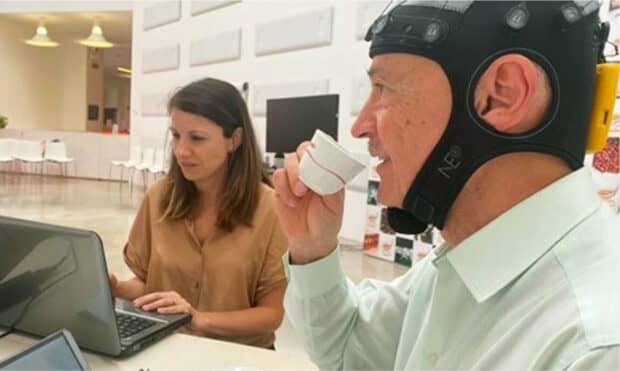[[{“value”:”
An example of panelist monitored during electroencephalogram recording at the International Coffee Tasting 2022, Summer Session, hosted at the Mumac Academy premises in Binasco, Milan, Italy, in July 2022. Credit: National Research Council of Italy. Press photo.
A potentially novel tool designed to identify bias in coffee evaluation may soon be in the works: a tasting helmet.
Researchers in Italy say they have demonstrated the feasibility of using wearable technology, like headgear, to measure emotional responses to coffee tasting. They said their study is the first in which wearable sensors have been employed to examine the implicit emotional responses of experienced coffee judges.
The peer-reviewed study was published in The Journal of the Science of Food and Agruculture, a Wiley publication associated with the Society of Chemical Industry (SCI),
For the study, the Italian team used what are known as the electrocardiographic (ECG) signal, the Galvanic Skin Response (GSR) and the electroencephalographic signal (EEG). The methods measured the electrical activity of the cardiac muscle, the skin and the brain.
“The findings revealed significant correlations between these biomedical signals and data obtained from conventional questionnaires across all sensory domains, confirming the viability of the approach for enhancing the quality assessment of coffee,” the researchers wrote.
As goofy as it seems, identifying and eliminating bias in the evaluation of coffee has been a major initiative of one of the coffee industry’s leading advocacy organizations, the Specialty Coffee Association, over the past three years. Designed to replace the traditional cupping form and 100-point scale for professional tasters, the SCA’s new Coffee Value Assessment seeks to scientifically account for bias in the evaluation of coffee.
While the SCA’s tools are already being employed by working coffee roasters, the Italian tasting helmet may need a little more time in the oven. The researchers noted that more work should be done — including collaboration with professional tasters and the industry — before the methods outlined in their study are refined for practical applications.
“This research could open a new perspective into sensory analysis of coffee tasting,” Lucia Billeci, a researcher at the Institute of Clinical Physiology of the National Research Council of Italy (IFC-CNR) and corresponding author of the study, said in an announcement from SCI. “Aside from the usual questionnaires, panelists and judges could be equipped by minimally invasive devices and can be monitored in terms of the emotions triggering physiological responses.”
Comments? Questions? News to share? Contact DCN’s editors here.
Related Posts
“}]]


